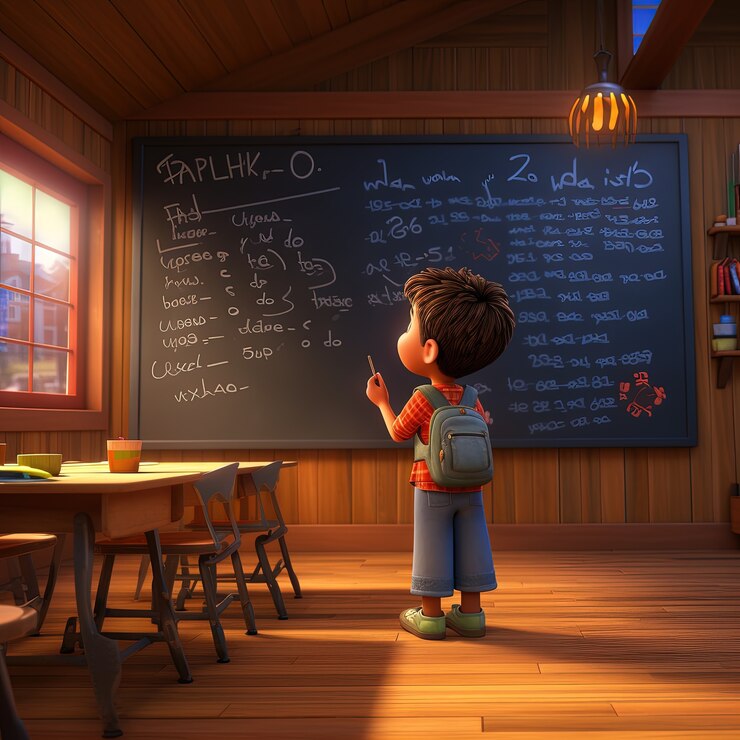The Fox And The Grapes
A Fox one day spied a beautiful bunch of ripe grapes hanging from a vine trained along the branches of a tree. The grapes seemed ready to burst with juice, and the Fox’s mouth watered as he gazed longingly at them.
The bunch hung from a high branch, and the Fox had to jump for it. The first time he jumped he missed it by a long way. So he walked off a short distance and took a running leap at it, only to fall short once more. Again and again he tried, but in vain.
Now he sat down and looked at the grapes in disgust.
“What a fool I am,” he said. “Here I am wearing myself out to get a bunch of sour grapes that are not worth gaping for.”
And off he walked very, very scornfully.
There are many who pretend to despise and belittle that which is beyond their reach.
Fat and thin
Two friends — one a fat man and the other a thin man — met at the Nikolaevsky station. The fat man had just dined in the station and his greasy lips shone like ripe cherries. He smelt of sherry and fleur d’orange. The thin man had just slipped out of the train and was laden with portmanteaus, bundles, and bandboxes. He smelt of ham and coffee grounds. A thin woman with a long chin, his wife, and a tall schoolboy with one eye screwed up came into view behind his back.
“Porfiry,” cried the fat man on seeing the thin man. “Is it you? My dear fellow! How many summers, how many winters!”
“Holy saints!” cried the thin man in amazement. “Misha! The friend of my childhood! Where have you dropped from?”
The friends kissed each other three times, and gazed at each other with eyes full of tears. Both were agreeably astounded.
“My dear boy!” began the thin man after the kissing. “This is unexpected! This is a surprise! Come have a good look at me! Just as handsome as I used to be! Just as great a darling and a dandy! Good gracious me! Well, and how are you? Made your fortune? Married? I am married as you see. . . . This is my wife Luise, her maiden name was Vantsenbach . . . of the Lutheran persuasion. . . . And this is my son Nafanail, a schoolboy in the third class. This is the friend of my childhood, Nafanya. We were boys at school together!”
Nafanail thought a little and took off his cap.
“We were boys at school together,” the thin man went on. “Do you remember how they used to tease you? You were nicknamed Herostratus because you burned a hole in a schoolbook with a cigarette, and I was nicknamed Ephialtes because I was fond of telling tales. Ho–ho! . . . we were children! . . . Don’t be shy, Nafanya. Go nearer to him. And this is my wife, her maiden name was Vantsenbach, of the Lutheran persuasion. . . .”
Nafanail thought a little and took refuge behind his father’s back.
“Well, how are you doing my friend?” the fat man asked, looking enthusiastically at his friend. “Are you in the service? What grade have you reached?”
“I am, dear boy! I have been a collegiate assessor for the last two years and I have the Stanislav. The salary is poor, but that’s no great matter! The wife gives music lessons, and I go in for carving wooden cigarette cases in a private way. Capital cigarette cases! I sell them for a rouble each. If any one takes ten or more I make a reduction of course. We get along somehow. I served as a clerk, you know, and now I have been transferred here as a head clerk in the same department. I am going to serve here. And what about you? I bet you are a civil councillor by now? Eh?”
“No dear boy, go higher than that,” said the fat man. “I have risen to privy councillor already . . . I have two stars.”
The thin man turned pale and rigid all at once, but soon his face twisted in all directions in the broadest smile; it seemed as though sparks were flashing from his face and eyes. He squirmed, he doubled together, crumpled up. . . . His portmanteaus, bundles and cardboard boxes seemed to shrink and crumple up too. . . . His wife’s long chin grew longer still; Nafanail drew himself up to attention and fastened all the buttons of his uniform.
“Your Excellency, I . . . delighted! The friend, one may say, of childhood and to have turned into such a great man! He–he!”
“Come, come!” the fat man frowned. “What’s this tone for? You and I were friends as boys, and there is no need of this official obsequiousness!”
“Merciful heavens, your Excellency! What are you saying. . . ?” sniggered the thin man, wriggling more than ever. “Your Excellency’s gracious attention is like refreshing manna. . . . This, your Excellency, is my son Nafanail, . . . my wife Luise, a Lutheran in a certain sense.”
The fat man was about to make some protest, but the face of the thin man wore an expression of such reverence, sugariness, and mawkish respectfulness that the privy councillor was sickened. He turned away from the thin man, giving him his hand at parting.
The thin man pressed three fingers, bowed his whole body and sniggered like a Chinaman: “He–he–he!” His wife smiled. Nafanail scraped with his foot and dropped his cap. All three were agreeably overwhelmed.
The coming of a king
OME children were at play in their play-ground one
day, when a herald rode through the town, blowing a trumpet, and crying aloud, “The King! the King passes by this road to-day. Make ready for the King!”
The children stopped their play, and looked at one another.
“Did you hear that?” they said. “The King is coming. He may look over the wall and see our playground; who knows? We must put it in order.”
The playground was sadly dirty, and in the corners were scraps of paper and broken toys, for these were careless children. But now, one brought a hoe, and another a rake, and a third ran to fetch the wheelbarrow from behind the garden gate. They labored hard, till at length all was clean and tidy.
“Now it is clean!” they said; “but we must make it pretty, too, for kings are used to fine things; maybe he would not notice mere cleanness, for he may have it all the time.”
Then one brought sweet rushes and strewed them on the ground; and others made garlands of oak leaves and pine tassels and hung them on the walls; and the littlest one pulled marigold buds and threw them all about the playground, “to look like gold,” he said.
When all was done the playground was so beautiful that the children stood and looked at it, and clapped their hands with pleasure.
“Let us keep it always like this!” said the littlest one; and the others cried, “Yes! yes! that is what we will do.”
They waited all day for the coming of the King, but he never came; only, towards sunset, a man with travel-worn clothes, and a kind, tired face passed along the road, and stopped to look over the wall.
“What a pleasant place!” said the man. “May I come in and rest, dear children?”
The children brought him in gladly, and set him on the seat that they had made out of an old cask. They had covered it with the old red cloak to make it look like a throne, and it made a very good one.
“It is our playground!” they said. “We made it pretty for the King, but he did not come, and now we mean to keep it so for ourselves.”
“That is good!” said the man.
“Because we think pretty and clean is nicer than ugly and dirty!” said another.
“That is better!” said the man.
“And for tired people to rest in!” said the littlest one.
“That is best of all!” said the man.
He sat and rested, and looked at the children with such kind eyes that they came about him, and told him all they knew; about the five puppies in the barn, and the thrush’s nest with four blue eggs, and the shore where the gold shells grew; and the man nodded and understood all about it.
By and by he asked for a cup of water, and they brought it to him in the best cup, with the gold sprigs on it: then he[14] thanked the children, and rose and went on his way; but before he went he laid his hand on their heads for a moment, and the touch went warm to their hearts.
The children stood by the wall and watched the man as he went slowly along. The sun was setting, and the light fell in long slanting rays across the road.
“He looks so tired!” said one of the children.
“But he was so kind!” said another.
“See!” said the littlest one. “How the sun shines on his hair! it looks like a crown of gold.”
Source of the stories: American literature (from Aesop)
To get updates on the newly uploaded content on stories, rhymes, riddles, poems and parenting tips.







+ There are no comments
Add yours